2023年江西中考英语复习 七年级下册 Units 4~6课件(共82张PPT)
文档属性
| 名称 | 2023年江西中考英语复习 七年级下册 Units 4~6课件(共82张PPT) | 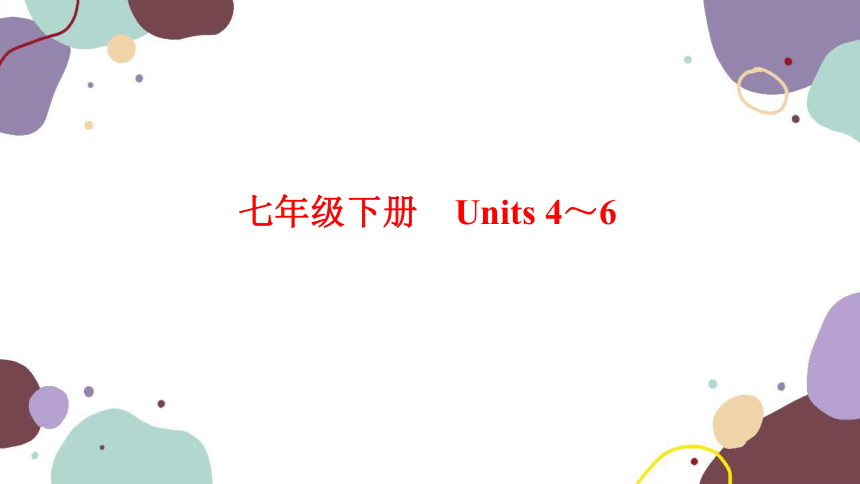 | |
| 格式 | ppt | ||
| 文件大小 | 972.0KB | ||
| 资源类型 | 教案 | ||
| 版本资源 | 人教新目标(Go for it)版 | ||
| 科目 | 英语 | ||
| 更新时间 | 2023-06-11 06:21:54 | ||
图片预览

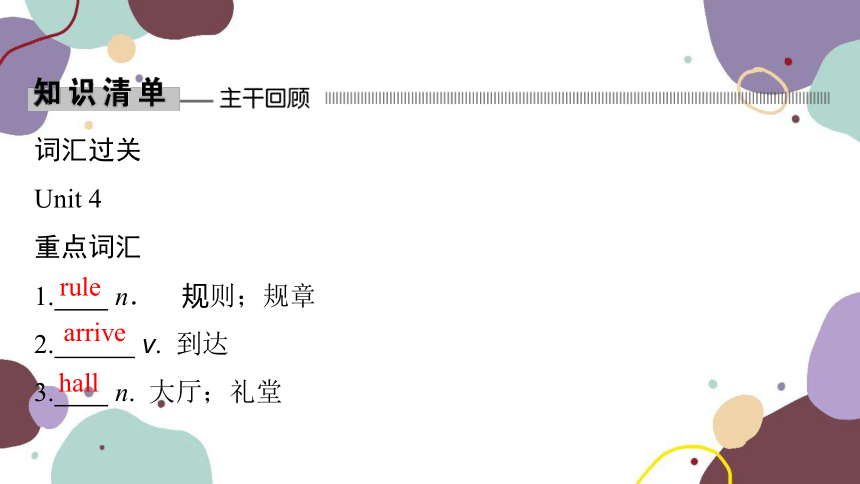

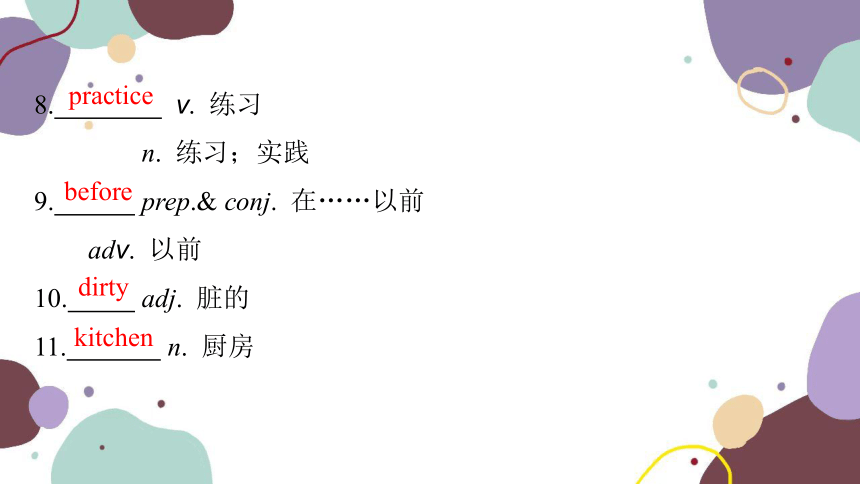
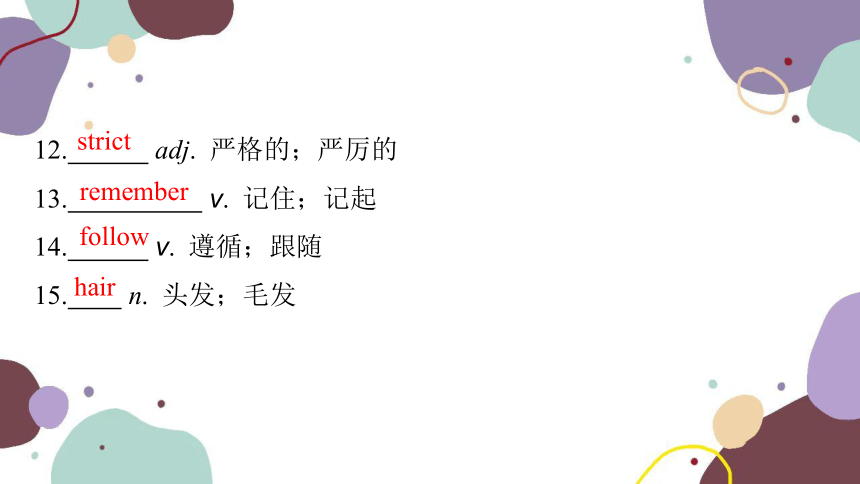
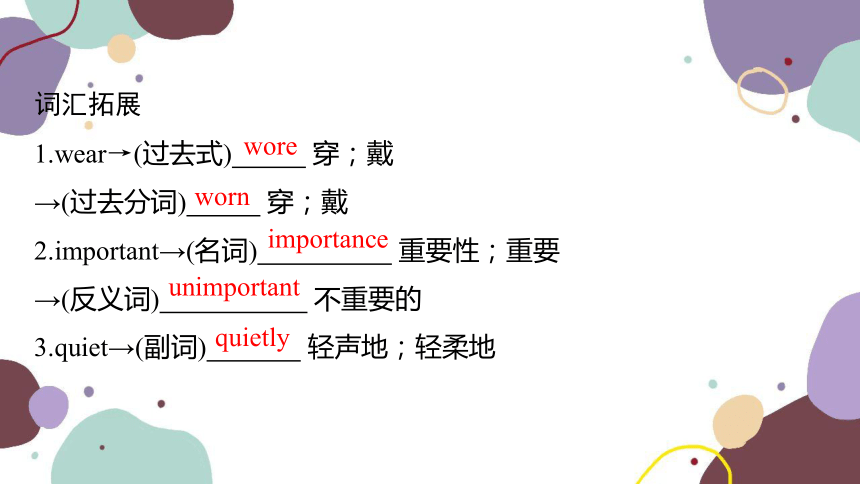
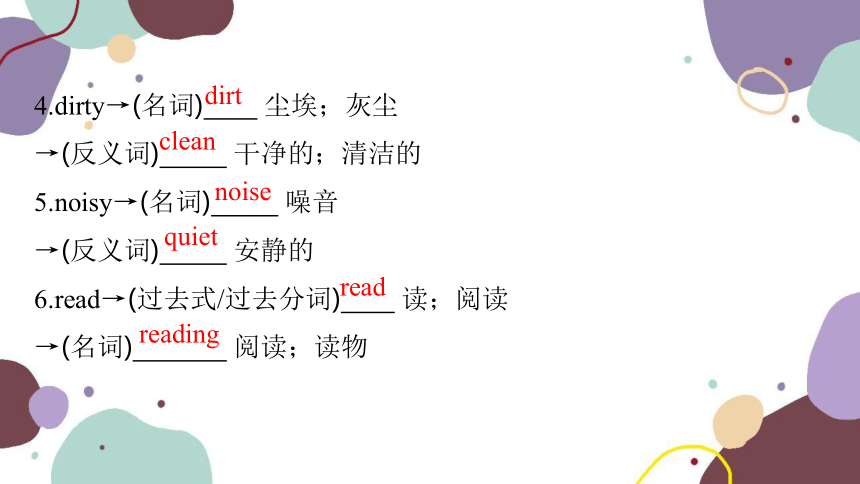
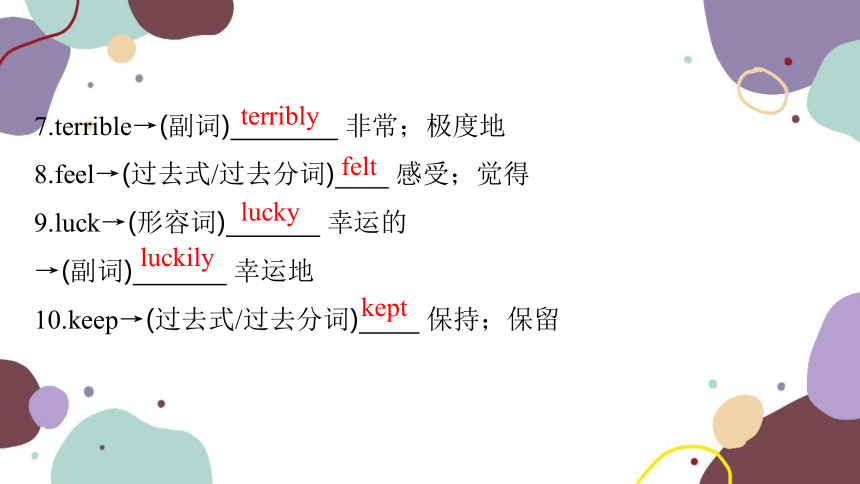
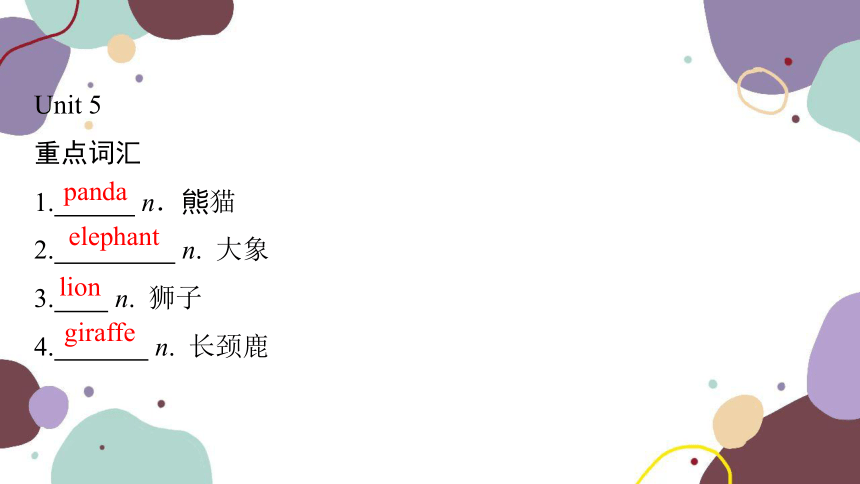


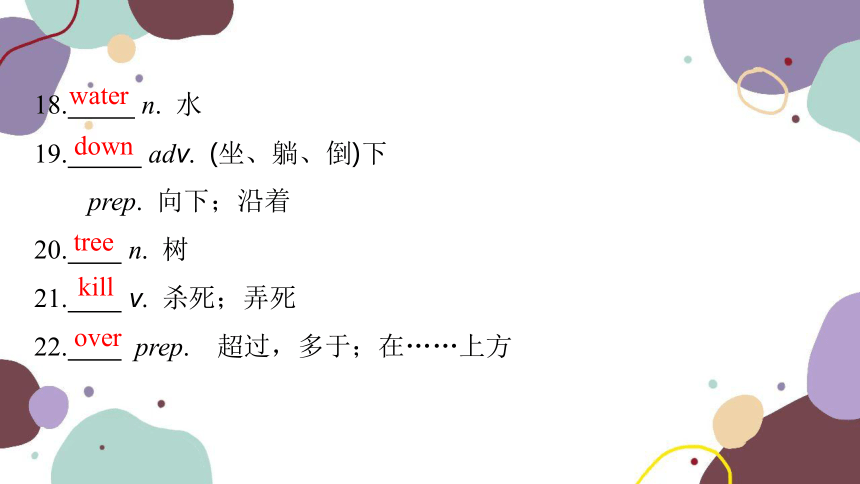
文档简介
(共82张PPT)
七年级下册 Units 4~6
词汇过关
Unit 4
重点词汇
1. n. 规则;规章
2. v. 到达
3. n. 大厅;礼堂
rule
arrive
hall
4. v. 听;倾听
5. adj. 抱歉的;难过的;惋惜的
6. adv. 在外面
adj. 外面的
7. adv. 外出
listen
sorry
outside
out
8. v. 练习
n. 练习;实践
9. prep.& conj. 在……以前
adv. 以前
10. adj. 脏的
11. n. 厨房
practice
before
dirty
kitchen
12. adj. 严格的;严厉的
13. v. 记住;记起
14. v. 遵循;跟随
15. n. 头发;毛发
strict
remember
follow
hair
词汇拓展
1.wear→(过去式) 穿;戴
→(过去分词) 穿;戴
2.important→(名词) 重要性;重要
→(反义词) 不重要的
3.quiet→(副词) 轻声地;轻柔地
wore
worn
importance
unimportant
quietly
4.dirty→(名词) 尘埃;灰尘
→(反义词) 干净的;清洁的
5.noisy→(名词) 噪音
→(反义词) 安静的
6.read→(过去式/过去分词) 读;阅读
→(名词) 阅读;读物
dirt
clean
noise
quiet
read
reading
7.terrible→(副词) 非常;极度地
8.feel→(过去式/过去分词) 感受;觉得
9.luck→(形容词) 幸运的
→(副词) 幸运地
10.keep→(过去式/过去分词) 保持;保留
felt
lucky
terribly
luckily
kept
Unit 5
重点词汇
1. n.熊猫
2. n. 大象
3. n. 狮子
4. n. 长颈鹿
panda
elephant
lion
giraffe
5. n. 动物
6. adj. 可爱的;机灵的
7. adj. 懒散的;懒惰的
8. adj. 聪明的
9. n. 种类
10. n. 宠物
animal
cute
lazy
smart
kind
pet
11. n. 腿
12. n. 猫
13. adj. 羞怯的;腼腆的
14. v. 救;救助
15. n. 旗;旗帜
16. v. 忘记;遗忘
17. n. 地点;位置
leg
cat
shy
save
flag
forget
place
18. n. 水
19. adv. (坐、躺、倒)下
prep. 向下;沿着
20. n. 树
21. v. 杀死;弄死
22. prep. 超过,多于;在……上方
water
down
tree
kill
over
词汇拓展
1.beautiful→(名词) 美;美丽;美好的东西;美人
→(副词) 漂亮地;美好地
2.Australia→(名词/形容词) 澳大利亚人;澳大利亚人的;澳大利亚的
3.Africa→(名词/形容词) 非洲人;非洲人的;非洲的
beauty
beautifully
Australian
African
4.south→(形容词) 南方的
→(对应词) 北方
5.friendly→(名词) 朋友
→(名词) 友谊
6.shy→(名词) 羞怯;腼腆
southern
north
friend
friendship
shyness
7.danger→(形容词) 有危险的;不安全的
→(形容词的反义词) 安全的;无危险的
8.sleep→(过去式/过去分词) 睡觉
→(形容词) 瞌睡的;困乏的
→(形容词) 睡着的
→(反义词) 醒来
dangerous
safe
slept
sleepy
asleep
wake
9.forget→(过去式) 忘记;遗忘
→(过去分词) 忘记;遗忘
10.cut→(过去式/过去分词) 砍;切
forgot
forgotten
cut
Unit 6
重点词汇
1. n.报纸
2. v. 洗
3. adv. 只是;恰好
4. n. 房子
newspaper
wash
just
house
5. adv. 在明天
n. 明天;未来
6. n. 竞赛
7. v.& n. 学习;研究
8. adj. 任何的;任一的
pron. 任何;任一
tomorrow
race
study
any
9. adj. 另外的;其他的
pron. 另外的人(或物)
10. adj. 幼小的;年轻的
11. v. 怀念;思念;错过
12. v. 希望
13. adv. 还;仍然
14. adj. 可口的;美味的
other
young
miss
wish
still
delicious
词汇拓展
1.man→(复数形式) 男人;人
2.any→(近义词) 一些
3.young→(比较级) 较年轻的
→(最高级) 最年轻的
→(反义词) 老的
men
some
younger
youngest
old
4.child→(复数形式) 儿童
5.wish→(同义词) 希望
6.America→(名词/形容词) 美国人;美国的
7.drink→(过去式) 喝→(过去分词) 喝
children
hope
American
drank
drunk
重点短语
Unit 4
1.准时_________
2.听…… ________
3.外出(娱乐) _______
4.(对某人)要求严格 _________________
5.遵守规则 _______________
on time
listen to
go out
be strict (with sb.)
follow the rules
Unit 5
1.稍微;有点儿 ________
2.迷路 ________
3.处于(极大)危险之中 ___________________
4.砍倒 __________
5.由……制成的 _____________
kind of
get lost
be in (great) danger
cut down
(be) made of
Unit 6
1.看电影 _________________
2.出去吃饭 _______
go to the movies
eat out
重点句型
Unit 4
1. the ?你(们)的校规是什么?
2. in the library.在图书馆里要安静。
3. music in class.不要在课堂上听音乐。
What are
rules
Be quiet
Don't listen to
4.Parents and schools sometimes ,but remember,they make rules to help us.父母和学校有时会很严格,但是记住,他们制订规则是为了帮助我们。
are
strict
Unit 5
1.— you like pandas?
你为什么喜欢熊猫?
— they're interesting.
因为它们有几分有趣。
Why do
Because
kind of
2.— lions from?狮子来自哪里?
—They're .它们来自南非。
3. animals you like?你喜欢什么动物?
4.—What can he do?他能做什么?
—He can .他能用两条腿走路。
5.The elephant is Thailand's .大象是泰国的象征之一。
Where are
from South Africa
What
do
walk on two legs
one of
symbols
Unit 6
1.—What you ?你在做什么?
— .我在看电视。
2.— he a newspaper?
他是在看报纸吗?
—Yes, .是的,他是(在看报纸)。
are
doing
I'm watching TV
Is
reading
he is
3.—Do you want to dinner?
你想跟我一起吃晚饭吗?
—Yeah.I'd love to.是的,我愿意。
4.—What time is it in Beijing?北京现在几点?
— in the morning.早上八点。
5.Zhu Hui misses his family and have his mom's delicious zongzi.朱辉想念他的家人,渴望吃到他母亲包的美味的粽子。
join me for
It's eight o'clock
wishes to
语法
1.祈使句
2.情态动词can、have to与must
3.why、what、where及because引导的句子
4.现在进行时(Ⅰ)
话题
Unit 4 Rules (规章制度)
Unit 5 Animals in a zoo (动物园的动物)
Unit 6 Everyday activities (日常活动)
strict的用法
[考点演练]
1.The teachers are very strict the students because they want them to be successful in the future.
A.about B.at
C.with D.in
C
2.Students should learn that it's responsible to be strict what they do.
A.of B.by
C.for D.in
D
[考点精讲]
Our teachers are strict with us at school.
我们的老师在学校严格要求我们。
辨析bring、take、get/fetch与carry
[考点演练]
3.
Alice's father promised that he would ______ her a birthday present when coming home. One day,Alice got a call from the post office and was asked to go there ______ a box. Alice rushed to the post office but found the box was too heavy to ______. So she asked her friend Ann for help. Arriving home,Alice opened the box and found that it was her favorite Hello Kitty chair!She thought it was a pity that she couldn't _____ this wonderful present to school to share the joy with her classmates because it was too heavy!
bring
to get
carry
take
[考点精讲]
remember的用法
[考点演练]
4.I remember the book to you,but it still seems to be in my bag.
5.It will be windy tonight.So please remember the windows when you leave the classroom.
returning
to close
6.Little Grace didn't stop until her mother filled her pocket with some candies.
7.I regret you that I will leave the city next term because my parents will move to Shanghai.
crying
to tell
8.Don't forget your kindness to everyone who treats you well. It's a matter of politeness.
9.Trying more friends and communicating with others are good for your development.
to show
making
[考点精讲]
remember作动词,意为“记住;记起”,后常跟名词或代词等作宾语。
[一言辨异]
I remembered reading this novel,but I didn't remember to return it to the library.我记得读过这本小说了,但是不记得把它还到图书馆。
[拓展延伸]
keep的用法
[考点演练]
10.Keep on . The higher you climb,the farther you will see.
11.Tom is a shy boy and he always keeps everything to and never shares his feelings with others.
climbing
himself
12.I go running every day.I think it's a good habit.It keeps me .
13.Nothing can keep you from what you want.You are the one to control your life and decide who you want to be.
healthy
getting
[考点精讲]
You'd better keep calm before finding a solution.
在找到解决办法之前你最好保持冷静。
Coffee can keep you awake.咖啡能让你保持清醒。
She kept (on) working although she was tired.
她虽然疲劳,但仍继续工作。
辨析 too many、too much与 much too
[考点演练]
14.You become fatter and fatter because you eat junk food. You should pay attention to your eating habits.
15.I have things to tell my friend who I haven't seen for a long time.
too much
too many
16.Playing smart phones for a long time is harmful to our eyes.
17.There are too many at the school gate so that I can't find my sister quickly.
18.Jack is walking much too . Nancy can hardly catch up with him.
much too
students
fast
[考点精讲]
词组 含义及用法 示例
too many 意为“太多的”,修饰可数名词复数 too many books太多书
too much 意为“太多的”,修饰不可数名词 too much milk太多牛奶
意为“太多”,用作副词词组,修饰动词 exercise too much运动过度
词组 含义及用法 示例
much too 意为“太,非常”,修饰形容词或副词,常用在形容词或副词前 much too noisy太吵闹
much too carefully太过谨慎
[一言辨异]
I'm much too tired this week because I have too much work.我这个星期太累了,因为我有太多的工作。
Why don't you...?句型
[考点演练]
19.—Don't be shy! Why don't you to make more friends
—OK,I'll have a try.
A.trying B.try
C.to try D.tried
B
20.—Why not pay a visit to Jiangxi this summer holiday,Harry
— ! We'll have a lot of fun there.
A.I think so B.Thank you
C.Good idea D.My pleasure
C
[考点精讲]
“Why don't you do sth.?”意为“你为什么不做某事?”,这是一种提建议的句型,该结构相当于“Why not do sth.?”或“How/What about doing sth.?”
(1)肯定回答可用“Good idea./OK!/Certainly./Of course./All right./With pleasure./Sounds good/Great!”等。
(2)否定回答可用“No,thanks./I'm afraid not./No,I don't think so./Sorry,I/we can't.”等。
辨析other、the other、another、others与the others
[考点演练]
21.—I'm sorry.I broke your tea cup.
—It doesn't matter.I have one at home.
A.the other B.others
C.another D.other
C
22.Some people like to rest in their free time. _______ like to travel.
23.This cake is delicious!Can I have _______ piece,please
24.Mr. Harris and Mrs. Bate and three _______ teachers attended the meeting.
Others
another
other
25.There were three books on my table. One is here. Where are __________
26.Mr. Black bought two bikes. One is for his wife,and _______ is for his son.
the others
the other
[考点精讲]
词(组) 含义及用法
other “别的,其他的”,其后可接名词复数
the other 表示两者中的“另一个(人或物)”,是特指,常用于“one...the other...”结构中,表示“一个……,另一个……”,the other之后也可接数词或可数名词复数,特指“其他的”
词(组) 含义及用法
another (2015、T57) 泛指“三者或三者以上中的另一个”,其后接单数名词
others 用作代词,泛指“其他的人或物”,与some对比时使用,表示“有的……,有的……”
the others 特指在一个范围内的“其他的人或物”
1.rule
熟义:n.规则;规章
生义:A.v.操纵 B.v.控制;统治;支配
Although there was some trade between China and the rest of the world for some time,the silk trade developed quickly during the Han Dynasty (朝代) which ruled from 206 BC to 220 AD.___
B
2.follow
熟义:v.遵循;跟随
生义:A.v.仿效 B.v.理解
C.v.(对……产生浓厚兴趣而)关注
①I don't want you to follow my example and spend too much time on computer games. ___
②Look up the words that you think are important to understand the text or follow the sentences. ___
A
B
3.keep
熟义:v.保持;保留
v.继续,重复(做某事);存放;保护;饲养
生义:A.v.存储(信息) B.v.保守;遵守
①His father kept his promise and bought the little boy his favorite gift.[2019福建] ___
②Many students' information is kept in the teacher's computer. ___
B
A
4.place
熟义:n.地点;位置 n.城镇(或建筑物等)
生义:A.n.名次 B.v.放置;安放
①He placed his hand on her shoulder to give her comfort(安慰).___
②To everyone's surprise,the poorly dressed Zhang took the first place in the exam. ___
B
A
5.water
熟义:n.水
生义:A.v.给……浇水/喝水 B.n.领海;海域 C.v.流口水
①This animal is found in coastal waters around the Indian Ocean. ___
②The farmers will water their fields by themselves if it doesn't rain in a week. ___
③Every time I see the strawberries,the sweet taste and beautiful color always make my mouth water. ___
B
A
C
6.cut down
熟义:砍倒
生义:A.停止 B.削减
You may want to cut down on your “food miles”—the distance that a product has travelled before it reaches your kitchen.[2019江西] ___
B
Ⅰ.单项填空
1.—I want to watch TV the whole day after the long journey.
—You shouldn't watch TV too much.It's bad your eyes.
A.on B.in
C.for D.with
C
2.The 119 passengers are Liu Chuanjian.Without him, they would probably have lost their lives.
A.hard on
B.thankful to
C.friendly to
D.responsible for
B
3.—Hurry up!
—One moment.I my e mail and then I'm ready to go.
A.read B.am reading
C.was reading D.have read
B
4.Tom is not here.He in the health club.
A.is exercising B.was exercising
C.exercises D.exercised
A
5.—It's hot today, isn't it
—Yes, I can't stand hot weather, but it will be even tomorrow.
A.hot B.cold
C.hotter D.colder
C
6.Small cars are useful in cities with narrow .
A.streets B.cinemas
C.squares D.shops
A
7.—Lin Jia, you have a loving grandma, right
—Yes, she always her time with me whenever I need her.
A.spends B.uses
C.takes D.pays
A
8.In fact, pandas have become so popular that they are now a of China.
A.subject B.symbol
C.sign D.spirit
B
9.If you fail, don't to learn a lesson from your failure.
A.ask B.miss
C.forget D.think
C
Ⅱ.选词填空
话题:介绍大象 难易度:★★☆ 体裁:说明文
A baby elephant weighs 200 pounds. Elephants are born with hair and look so 1.____.They lose their 2. ____ as they grow. Baby elephants live on their mother's milk. A baby elephant prefers 3. _______________ milk with its mouth instead of its trunk (象鼻) because babies' trunks are very short 4. _____ they grow up.
cute
hair
drinking/to drink
before
Baby elephants first 5. _____ to stand up.It takes them a long time to do that.They learn to use their trunks.They learn to hold and carry things with them.Mother and baby 6. __________ stay close together for four years. Mother elephants must 7. _____ their babies safe.Elephants live in groups called herds (畜群).They protect each other.The other elephants help the mother take care of her baby.
learn
elephants
keep
Young elephants like chasing (追赶) each other happily.They climb on each other. They throw sticks in the air with their trunks.Elephants are also 8. _________. They use their trunks to touch one another to greet. They wrap (缠绕) their trunks around each other.That is an elephant hug!
friendly
七年级下册 Units 4~6
词汇过关
Unit 4
重点词汇
1. n. 规则;规章
2. v. 到达
3. n. 大厅;礼堂
rule
arrive
hall
4. v. 听;倾听
5. adj. 抱歉的;难过的;惋惜的
6. adv. 在外面
adj. 外面的
7. adv. 外出
listen
sorry
outside
out
8. v. 练习
n. 练习;实践
9. prep.& conj. 在……以前
adv. 以前
10. adj. 脏的
11. n. 厨房
practice
before
dirty
kitchen
12. adj. 严格的;严厉的
13. v. 记住;记起
14. v. 遵循;跟随
15. n. 头发;毛发
strict
remember
follow
hair
词汇拓展
1.wear→(过去式) 穿;戴
→(过去分词) 穿;戴
2.important→(名词) 重要性;重要
→(反义词) 不重要的
3.quiet→(副词) 轻声地;轻柔地
wore
worn
importance
unimportant
quietly
4.dirty→(名词) 尘埃;灰尘
→(反义词) 干净的;清洁的
5.noisy→(名词) 噪音
→(反义词) 安静的
6.read→(过去式/过去分词) 读;阅读
→(名词) 阅读;读物
dirt
clean
noise
quiet
read
reading
7.terrible→(副词) 非常;极度地
8.feel→(过去式/过去分词) 感受;觉得
9.luck→(形容词) 幸运的
→(副词) 幸运地
10.keep→(过去式/过去分词) 保持;保留
felt
lucky
terribly
luckily
kept
Unit 5
重点词汇
1. n.熊猫
2. n. 大象
3. n. 狮子
4. n. 长颈鹿
panda
elephant
lion
giraffe
5. n. 动物
6. adj. 可爱的;机灵的
7. adj. 懒散的;懒惰的
8. adj. 聪明的
9. n. 种类
10. n. 宠物
animal
cute
lazy
smart
kind
pet
11. n. 腿
12. n. 猫
13. adj. 羞怯的;腼腆的
14. v. 救;救助
15. n. 旗;旗帜
16. v. 忘记;遗忘
17. n. 地点;位置
leg
cat
shy
save
flag
forget
place
18. n. 水
19. adv. (坐、躺、倒)下
prep. 向下;沿着
20. n. 树
21. v. 杀死;弄死
22. prep. 超过,多于;在……上方
water
down
tree
kill
over
词汇拓展
1.beautiful→(名词) 美;美丽;美好的东西;美人
→(副词) 漂亮地;美好地
2.Australia→(名词/形容词) 澳大利亚人;澳大利亚人的;澳大利亚的
3.Africa→(名词/形容词) 非洲人;非洲人的;非洲的
beauty
beautifully
Australian
African
4.south→(形容词) 南方的
→(对应词) 北方
5.friendly→(名词) 朋友
→(名词) 友谊
6.shy→(名词) 羞怯;腼腆
southern
north
friend
friendship
shyness
7.danger→(形容词) 有危险的;不安全的
→(形容词的反义词) 安全的;无危险的
8.sleep→(过去式/过去分词) 睡觉
→(形容词) 瞌睡的;困乏的
→(形容词) 睡着的
→(反义词) 醒来
dangerous
safe
slept
sleepy
asleep
wake
9.forget→(过去式) 忘记;遗忘
→(过去分词) 忘记;遗忘
10.cut→(过去式/过去分词) 砍;切
forgot
forgotten
cut
Unit 6
重点词汇
1. n.报纸
2. v. 洗
3. adv. 只是;恰好
4. n. 房子
newspaper
wash
just
house
5. adv. 在明天
n. 明天;未来
6. n. 竞赛
7. v.& n. 学习;研究
8. adj. 任何的;任一的
pron. 任何;任一
tomorrow
race
study
any
9. adj. 另外的;其他的
pron. 另外的人(或物)
10. adj. 幼小的;年轻的
11. v. 怀念;思念;错过
12. v. 希望
13. adv. 还;仍然
14. adj. 可口的;美味的
other
young
miss
wish
still
delicious
词汇拓展
1.man→(复数形式) 男人;人
2.any→(近义词) 一些
3.young→(比较级) 较年轻的
→(最高级) 最年轻的
→(反义词) 老的
men
some
younger
youngest
old
4.child→(复数形式) 儿童
5.wish→(同义词) 希望
6.America→(名词/形容词) 美国人;美国的
7.drink→(过去式) 喝→(过去分词) 喝
children
hope
American
drank
drunk
重点短语
Unit 4
1.准时_________
2.听…… ________
3.外出(娱乐) _______
4.(对某人)要求严格 _________________
5.遵守规则 _______________
on time
listen to
go out
be strict (with sb.)
follow the rules
Unit 5
1.稍微;有点儿 ________
2.迷路 ________
3.处于(极大)危险之中 ___________________
4.砍倒 __________
5.由……制成的 _____________
kind of
get lost
be in (great) danger
cut down
(be) made of
Unit 6
1.看电影 _________________
2.出去吃饭 _______
go to the movies
eat out
重点句型
Unit 4
1. the ?你(们)的校规是什么?
2. in the library.在图书馆里要安静。
3. music in class.不要在课堂上听音乐。
What are
rules
Be quiet
Don't listen to
4.Parents and schools sometimes ,but remember,they make rules to help us.父母和学校有时会很严格,但是记住,他们制订规则是为了帮助我们。
are
strict
Unit 5
1.— you like pandas?
你为什么喜欢熊猫?
— they're interesting.
因为它们有几分有趣。
Why do
Because
kind of
2.— lions from?狮子来自哪里?
—They're .它们来自南非。
3. animals you like?你喜欢什么动物?
4.—What can he do?他能做什么?
—He can .他能用两条腿走路。
5.The elephant is Thailand's .大象是泰国的象征之一。
Where are
from South Africa
What
do
walk on two legs
one of
symbols
Unit 6
1.—What you ?你在做什么?
— .我在看电视。
2.— he a newspaper?
他是在看报纸吗?
—Yes, .是的,他是(在看报纸)。
are
doing
I'm watching TV
Is
reading
he is
3.—Do you want to dinner?
你想跟我一起吃晚饭吗?
—Yeah.I'd love to.是的,我愿意。
4.—What time is it in Beijing?北京现在几点?
— in the morning.早上八点。
5.Zhu Hui misses his family and have his mom's delicious zongzi.朱辉想念他的家人,渴望吃到他母亲包的美味的粽子。
join me for
It's eight o'clock
wishes to
语法
1.祈使句
2.情态动词can、have to与must
3.why、what、where及because引导的句子
4.现在进行时(Ⅰ)
话题
Unit 4 Rules (规章制度)
Unit 5 Animals in a zoo (动物园的动物)
Unit 6 Everyday activities (日常活动)
strict的用法
[考点演练]
1.The teachers are very strict the students because they want them to be successful in the future.
A.about B.at
C.with D.in
C
2.Students should learn that it's responsible to be strict what they do.
A.of B.by
C.for D.in
D
[考点精讲]
Our teachers are strict with us at school.
我们的老师在学校严格要求我们。
辨析bring、take、get/fetch与carry
[考点演练]
3.
Alice's father promised that he would ______ her a birthday present when coming home. One day,Alice got a call from the post office and was asked to go there ______ a box. Alice rushed to the post office but found the box was too heavy to ______. So she asked her friend Ann for help. Arriving home,Alice opened the box and found that it was her favorite Hello Kitty chair!She thought it was a pity that she couldn't _____ this wonderful present to school to share the joy with her classmates because it was too heavy!
bring
to get
carry
take
[考点精讲]
remember的用法
[考点演练]
4.I remember the book to you,but it still seems to be in my bag.
5.It will be windy tonight.So please remember the windows when you leave the classroom.
returning
to close
6.Little Grace didn't stop until her mother filled her pocket with some candies.
7.I regret you that I will leave the city next term because my parents will move to Shanghai.
crying
to tell
8.Don't forget your kindness to everyone who treats you well. It's a matter of politeness.
9.Trying more friends and communicating with others are good for your development.
to show
making
[考点精讲]
remember作动词,意为“记住;记起”,后常跟名词或代词等作宾语。
[一言辨异]
I remembered reading this novel,but I didn't remember to return it to the library.我记得读过这本小说了,但是不记得把它还到图书馆。
[拓展延伸]
keep的用法
[考点演练]
10.Keep on . The higher you climb,the farther you will see.
11.Tom is a shy boy and he always keeps everything to and never shares his feelings with others.
climbing
himself
12.I go running every day.I think it's a good habit.It keeps me .
13.Nothing can keep you from what you want.You are the one to control your life and decide who you want to be.
healthy
getting
[考点精讲]
You'd better keep calm before finding a solution.
在找到解决办法之前你最好保持冷静。
Coffee can keep you awake.咖啡能让你保持清醒。
She kept (on) working although she was tired.
她虽然疲劳,但仍继续工作。
辨析 too many、too much与 much too
[考点演练]
14.You become fatter and fatter because you eat junk food. You should pay attention to your eating habits.
15.I have things to tell my friend who I haven't seen for a long time.
too much
too many
16.Playing smart phones for a long time is harmful to our eyes.
17.There are too many at the school gate so that I can't find my sister quickly.
18.Jack is walking much too . Nancy can hardly catch up with him.
much too
students
fast
[考点精讲]
词组 含义及用法 示例
too many 意为“太多的”,修饰可数名词复数 too many books太多书
too much 意为“太多的”,修饰不可数名词 too much milk太多牛奶
意为“太多”,用作副词词组,修饰动词 exercise too much运动过度
词组 含义及用法 示例
much too 意为“太,非常”,修饰形容词或副词,常用在形容词或副词前 much too noisy太吵闹
much too carefully太过谨慎
[一言辨异]
I'm much too tired this week because I have too much work.我这个星期太累了,因为我有太多的工作。
Why don't you...?句型
[考点演练]
19.—Don't be shy! Why don't you to make more friends
—OK,I'll have a try.
A.trying B.try
C.to try D.tried
B
20.—Why not pay a visit to Jiangxi this summer holiday,Harry
— ! We'll have a lot of fun there.
A.I think so B.Thank you
C.Good idea D.My pleasure
C
[考点精讲]
“Why don't you do sth.?”意为“你为什么不做某事?”,这是一种提建议的句型,该结构相当于“Why not do sth.?”或“How/What about doing sth.?”
(1)肯定回答可用“Good idea./OK!/Certainly./Of course./All right./With pleasure./Sounds good/Great!”等。
(2)否定回答可用“No,thanks./I'm afraid not./No,I don't think so./Sorry,I/we can't.”等。
辨析other、the other、another、others与the others
[考点演练]
21.—I'm sorry.I broke your tea cup.
—It doesn't matter.I have one at home.
A.the other B.others
C.another D.other
C
22.Some people like to rest in their free time. _______ like to travel.
23.This cake is delicious!Can I have _______ piece,please
24.Mr. Harris and Mrs. Bate and three _______ teachers attended the meeting.
Others
another
other
25.There were three books on my table. One is here. Where are __________
26.Mr. Black bought two bikes. One is for his wife,and _______ is for his son.
the others
the other
[考点精讲]
词(组) 含义及用法
other “别的,其他的”,其后可接名词复数
the other 表示两者中的“另一个(人或物)”,是特指,常用于“one...the other...”结构中,表示“一个……,另一个……”,the other之后也可接数词或可数名词复数,特指“其他的”
词(组) 含义及用法
another (2015、T57) 泛指“三者或三者以上中的另一个”,其后接单数名词
others 用作代词,泛指“其他的人或物”,与some对比时使用,表示“有的……,有的……”
the others 特指在一个范围内的“其他的人或物”
1.rule
熟义:n.规则;规章
生义:A.v.操纵 B.v.控制;统治;支配
Although there was some trade between China and the rest of the world for some time,the silk trade developed quickly during the Han Dynasty (朝代) which ruled from 206 BC to 220 AD.___
B
2.follow
熟义:v.遵循;跟随
生义:A.v.仿效 B.v.理解
C.v.(对……产生浓厚兴趣而)关注
①I don't want you to follow my example and spend too much time on computer games. ___
②Look up the words that you think are important to understand the text or follow the sentences. ___
A
B
3.keep
熟义:v.保持;保留
v.继续,重复(做某事);存放;保护;饲养
生义:A.v.存储(信息) B.v.保守;遵守
①His father kept his promise and bought the little boy his favorite gift.[2019福建] ___
②Many students' information is kept in the teacher's computer. ___
B
A
4.place
熟义:n.地点;位置 n.城镇(或建筑物等)
生义:A.n.名次 B.v.放置;安放
①He placed his hand on her shoulder to give her comfort(安慰).___
②To everyone's surprise,the poorly dressed Zhang took the first place in the exam. ___
B
A
5.water
熟义:n.水
生义:A.v.给……浇水/喝水 B.n.领海;海域 C.v.流口水
①This animal is found in coastal waters around the Indian Ocean. ___
②The farmers will water their fields by themselves if it doesn't rain in a week. ___
③Every time I see the strawberries,the sweet taste and beautiful color always make my mouth water. ___
B
A
C
6.cut down
熟义:砍倒
生义:A.停止 B.削减
You may want to cut down on your “food miles”—the distance that a product has travelled before it reaches your kitchen.[2019江西] ___
B
Ⅰ.单项填空
1.—I want to watch TV the whole day after the long journey.
—You shouldn't watch TV too much.It's bad your eyes.
A.on B.in
C.for D.with
C
2.The 119 passengers are Liu Chuanjian.Without him, they would probably have lost their lives.
A.hard on
B.thankful to
C.friendly to
D.responsible for
B
3.—Hurry up!
—One moment.I my e mail and then I'm ready to go.
A.read B.am reading
C.was reading D.have read
B
4.Tom is not here.He in the health club.
A.is exercising B.was exercising
C.exercises D.exercised
A
5.—It's hot today, isn't it
—Yes, I can't stand hot weather, but it will be even tomorrow.
A.hot B.cold
C.hotter D.colder
C
6.Small cars are useful in cities with narrow .
A.streets B.cinemas
C.squares D.shops
A
7.—Lin Jia, you have a loving grandma, right
—Yes, she always her time with me whenever I need her.
A.spends B.uses
C.takes D.pays
A
8.In fact, pandas have become so popular that they are now a of China.
A.subject B.symbol
C.sign D.spirit
B
9.If you fail, don't to learn a lesson from your failure.
A.ask B.miss
C.forget D.think
C
Ⅱ.选词填空
话题:介绍大象 难易度:★★☆ 体裁:说明文
A baby elephant weighs 200 pounds. Elephants are born with hair and look so 1.____.They lose their 2. ____ as they grow. Baby elephants live on their mother's milk. A baby elephant prefers 3. _______________ milk with its mouth instead of its trunk (象鼻) because babies' trunks are very short 4. _____ they grow up.
cute
hair
drinking/to drink
before
Baby elephants first 5. _____ to stand up.It takes them a long time to do that.They learn to use their trunks.They learn to hold and carry things with them.Mother and baby 6. __________ stay close together for four years. Mother elephants must 7. _____ their babies safe.Elephants live in groups called herds (畜群).They protect each other.The other elephants help the mother take care of her baby.
learn
elephants
keep
Young elephants like chasing (追赶) each other happily.They climb on each other. They throw sticks in the air with their trunks.Elephants are also 8. _________. They use their trunks to touch one another to greet. They wrap (缠绕) their trunks around each other.That is an elephant hug!
friendly
